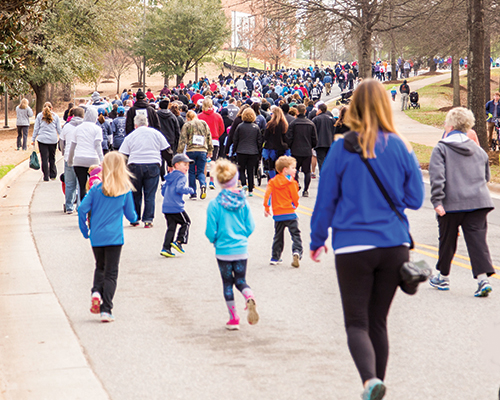
North Carolina’s screening rate for colon cancer is currently just above 68 percent. According to analysis by the National Colorectal Cancer Round Table, if North Carolina can reach 80 percent screening by 2018 (a national goal), 7,909 cases could be prevented and 5,796 lives could be saved by 2030 in our state alone.
Early diagnosis is the key to surviving a colorectal cancer. When detected in its early stages colon cancer has a 90 percent survival rate. Current guidelines suggest that patients with average risk begin screening at age 50. The United States Preventative Services Task Force (USPSTF) recommends the following tests for colon cancer screening. Your health care provider can provide more information about the best test for you based on your health history, symptoms, and risk level.
A colonoscopy can find and remove polyps (precancerous growths) during the procedure, preventing cancer. Your gastroenterologist will use a scope to examine the inside of the colon and look for polyps or evidence of disease. If polyps are found, they are removed and sent for further examination. The exam does require a full colon cleanse (prep) on the day before the test. Your doctor will also discuss sedation options to make the procedure as comfortable as possible.
All ages from all walks of life celebrate colon cancer survivors and honor caregivers
at the Get Your Rear in Gear® in Raleigh.
Colonoscopies are also used as a follow-up test if anything unusual is found during other types of screening. With normal results, a colonoscopy screening is repeated every 10 years.
The CT colonography (or virtual colonoscopy) uses a special x-ray to examine the colon for abnormalities. This test also requires a complete colon prep but does not require sedation. If evidence of polyps or cancer is found, a follow-up colonoscopy may be recommended. With normal results, this test should be repeated every five years.
A flexible sigmoidoscopy, like a colonoscopy, examines the inside of the colon for polyps or evidence of cancer. Unlike a colonoscopy, however, your doctor will only examine the rectum and part of the colon. A sigmoidoscopy will require a full colon prep; if evidence of cancer is found, a colonoscopy is generally recommended so the physician can look at the entire colon. A sigmoidoscopy should be done every five years with a stool test every three years.
There are also screening tests that are inexpensive and can be done in the privacy of your home. These stool tests detect blood in the stool. The kits are returned to your health care provider where samples are checked for blood or other evidence of cancer cells. If evidence of blood or cancer is found, further testing (including a colonoscopy) becomes necessary. The most common at-home tests are FIT and FOBT tests, while there are also new DNA stool tests on the market. Stool tests should be performed every year, while a DNA stool test may be done less often.
Be sure to talk with your doctor about the test that is right for you, as well as any signs or symptoms you may be experiencing. The best test is the one that gets done.
By Erin Peterson and Perry Shen, M.D., Wake Forest Baptist Health. Dr. Perry Shen is Surgical Oncology Fellowship Program Director and Surgical Sciences-Oncology Professor at Wake Forest Baptist Health in Winston-Salem. His clinical interests include gastrointestinal oncology, hepatobiliary, and pancreatic surgery and minimally invasive liver and pancreatic resection, sarcoma, peritoneal surface malignancies, and melanoma.
What are colon cancer symptoms?
Symptoms don’t always mean something is wrong. Long term discomfort or recurring and multiple symptoms, however, should be checked out by a doctor.
• Change in bowel habits, including diarrhea for more than three
days or constipation for more than two weeks
• Change in the color or shape of the stool
• Blood in stool or in the toilet after having a bowel movement
• Rectal bleeding
• Stomach discomfort or cramping, including a continual feeling
of discomfort or urge to have a bowel movement
• Unexplained fatigue, weakness or weight loss
More details about colon cancer, signs and symptoms, and screening options can be found at ColonCancerCoalition.org.
Who gets colon cancer?
Colon cancer affects men and women equally, all age groups and nationalities. Risk factors include:
• Aging: the risk for polyps increases with age, especially over
the age of 50
• A family history of polyps or of colon cancer
• Obesity
• Smoking
• A high fat diet
• Alcohol consumption


